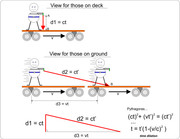Reality without objective evidence isn't real enough to be considered reality, IMO. Things unknowable seem more unreal than real.It's so hard to get our heads around the idea of a reality that had no beginning and will never end, but that's the 'reality' of it.
That's not an unreasonable suggestion, but it is subjective in nature. Don Meredith, one of my favorite quarterbacks, partly due to his colorful nature, often stated that, 'if "ifs" and "buts" were candy and nuts, we would all have a merry Christmas!'As far as the expansion of space is concerned, I believe it is expanding into another energetic fabric of reality that may have very different properties.
If I may borrow your comments, it might not hurt to share my view on the two important realms we find - Subjective and Objective realms.
Imagine a vast ocean with an sizeable island in the middle. The residents of the island are able to build remarkable, tangible, structures. The better the science the better the stuff on the island. This island represents science - objective based, firm footings, measurable, etc.
The ocean is the Sea of Subjectivity. It exists and it can be fun to swim in it, but it's very hard to build stuff there.
Then there is the estuary, where the sea (subjective realm) encounters the island (objective realm). This is somewhat rare, as is true on islands, but it happens. For instance, Aristotle's philosophy and religious dogma once argued the Earth had to be the center of the Universe. They might say that's just "reality". But Galileo, while doing science in the estuary, discovered that Venus' disk had both gibbous and crescent phases. This disproved the Geocentric model of Aristotle/Ptolemy/Aquinas. The Geocentric idea was testable, thus in our estuary.
I'm curious if anyone agrees with the above analogy enough for me to repeat it now and then?



